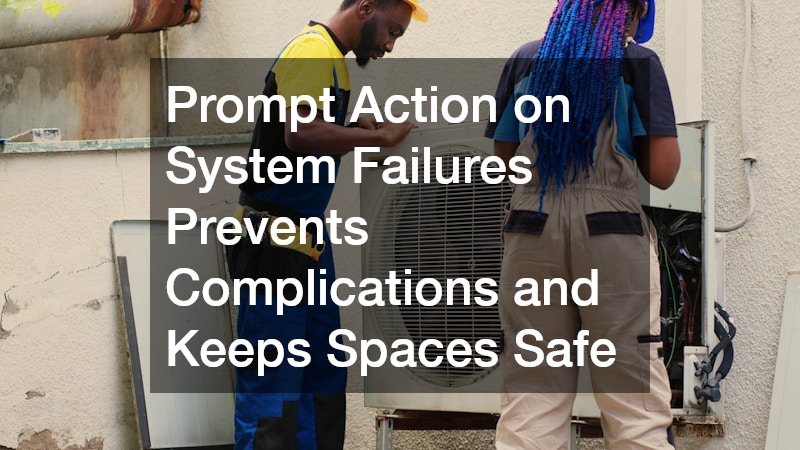Heating, Ventilation, and Air Conditioning (HVAC) systems are essential for creating a comfortable, safe, and healthy indoor environment. These systems help control temperature, ensure proper airflow, and filter out pollutants and allergens from the air we breathe. But when something goes wrong, especially during extreme weather or in sensitive environments, a minor issue can quickly escalate into an emergency.
Recognizing what counts as an emergency HVAC issue is critical for homeowners, renters, and business owners alike. Whether it’s a sudden breakdown in the middle of winter, strange burning odors, or unusual noises that signal mechanical failure, knowing when to take immediate action can help avoid health risks, property damage, and costly repairs.
In this quick guide, we’ll explore the most common signs of emergency HVAC issues, how they impact your safety and indoor air quality, and when it’s time to call in a professional right away.
1. What are the Common Signs of an Emergency HVAC Issue?
1.1 Sudden Loss of Heating or Cooling
Abrupt loss of heating or cooling could leave a space unbearably hot or frigid, disrupting daily life or business operations. This situation can be caused by issues such as failed compressors or blown fuses, which require quick diagnostics and repairs.
Without timely intervention, extreme temperatures can lead to equipment damage or health hazards, particularly for vulnerable populations like the elderly or young children. Understanding the urgency of such scenarios can prevent further complications and ensure safety.
Additionally, recognizing the early signs of system failure can help mitigate damage before it becomes an emergency. Regular maintenance and real-time monitoring systems, like smart thermostats, can alert homeowners or facility managers to potential problems before they escalate.
1.2 Unpleasant or Burning Odors
The presence of unusual smells from an HVAC system is often an alarming sign indicative of a severe underlying problem. Burning or electrical odors can signify overheating components or wiring issues, which pose a fire hazard if not promptly addressed.
Musty or moldy smells can point to moisture problems within the HVAC system, potentially leading to mold growth and associated health risks. Immediate action is vital in these cases to prevent structural damage and ensure air quality remains safe.
By addressing these odor issues quickly, homeowners can safeguard their property and health. Professional HVAC technicians have the expertise to identify the source of the odor and implement effective solutions to rectify the problem.
2. How Do HVAC Issues Affect Health and Safety?
2.1 Poor Indoor Air Quality
Malfunctioning HVAC systems can significantly impact indoor air quality by failing to filter airborne pollutants and allergens. This can exacerbate respiratory issues and allergies, posing serious health risks to occupants.
Poor air quality can also reduce concentration and productivity in work settings, further highlighting the importance of maintaining well-functioning HVAC systems. Regular filter changes and system checks are critical to ensure optimal air purification.
Additionally, the Environmental Protection Agency (EPA) estimates that indoor air can be two to five times more polluted than outdoor air, underlining the necessity for efficient HVAC operation. A proactive approach to HVAC maintenance can prevent air quality issues before they become severe.
2.2 Risk of Carbon Monoxide Leaks
Fuel-burning HVAC systems, such as those running on oil or gas, pose a risk of carbon monoxide leaks if they malfunction. Carbon monoxide is an odorless, colorless gas that can be fatal at high concentrations, making quick detection and repair crucial.
Symptoms of carbon monoxide poisoning can include headaches, dizziness, and confusion, which require immediate medical and professional HVAC intervention. Ensuring that systems are well-maintained and equipped with reliable detectors is vital for tenant safety.
Regular maintenance checks by certified technicians can prevent leaks and ensure that combustion systems are operating efficiently and safely. Investing in carbon monoxide alarms can provide an added layer of protection against this invisible threat.
3. When is it Time to Call a Professional Immediately?
3.1 Electrical Issues and Malfunctioning Thermostats
Electrical problems within an HVAC system, such as shorts or blown circuits, can lead to complete system failure or even fire hazards. A malfunctioning thermostat can also disrupt system operation, leading to inadequate temperature control.
These issues often require the expertise of certified HVAC technicians to diagnose and resolve safely. Attempting to troubleshoot electrical components without professional help can be dangerous and costly.
Investing in regular system inspections can help prevent these issues, ensuring systems are up to code and operating efficiently. Addressing small problems early can prevent costly repairs or replacements down the line.
3.2 Noisy or Unusual System Operations
Unusual noises, such as banging, clanking, or screeching, often indicate significant problems within an HVAC system. These sounds can be caused by loose belts, failing motors, or debris caught in the fan, which can worsen without prompt attention.
Addressing these noises quickly prevents further damage and costly repairs, while ensuring comfort and efficiency are restored. A proactive approach to noise complaints can lead to early detection and resolution of these issues.
Professional assessment can identify exact causes and provide effective solutions, maintaining the system’s longevity and performance. Routine maintenance checks can often catch potential issues before they result in disruptive noises.
Understanding what constitutes an emergency HVAC issue is crucial for ensuring both comfort and safety within any space. Immediate attention to signs of system failure prevents further complications and maintains a secure living or working environment. Regular professional maintenance helps prevent emergencies and ensures HVAC systems are operating at peak performance.

